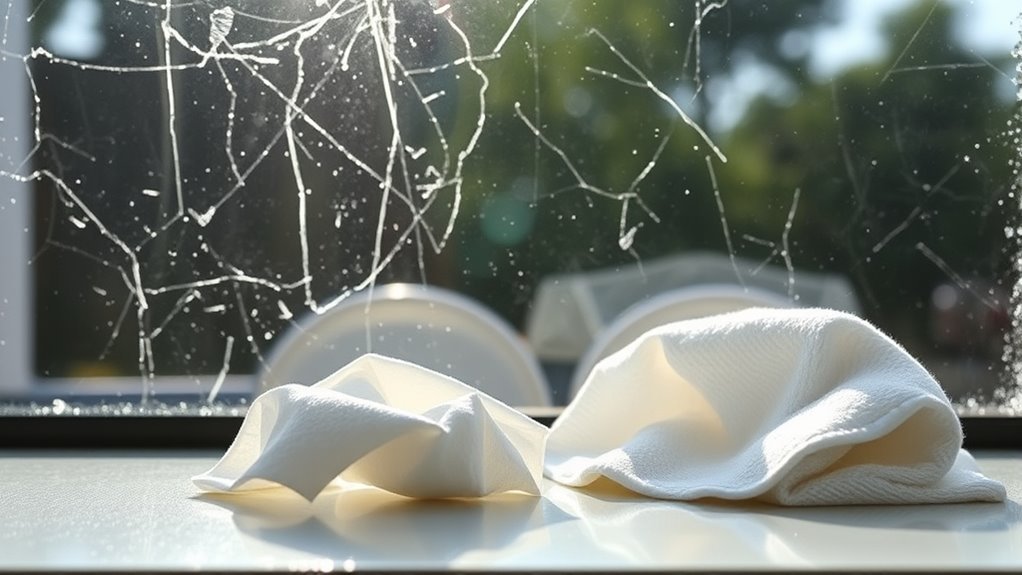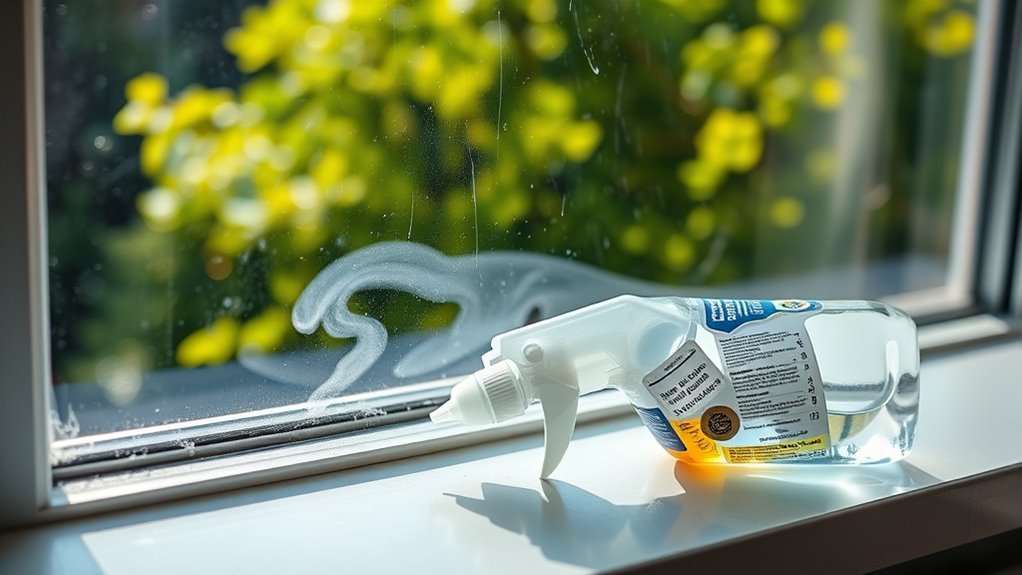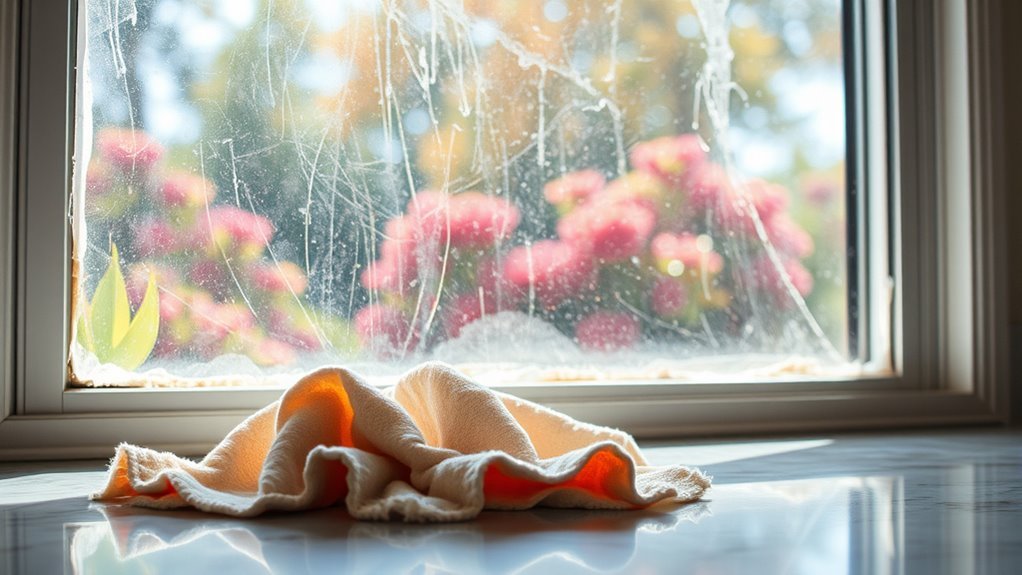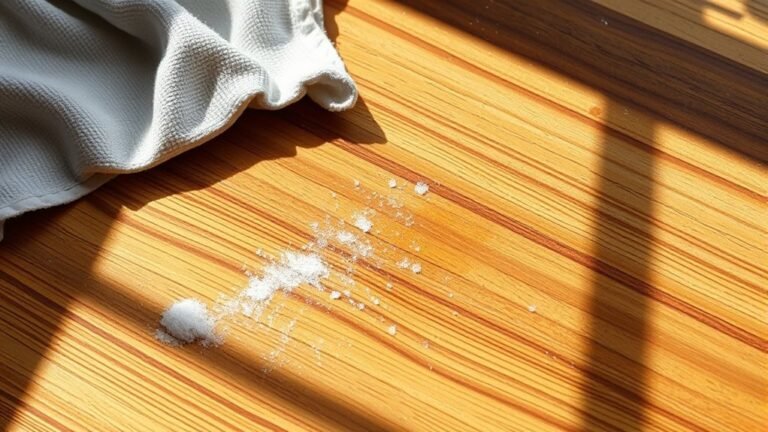Common Mistakes When Cleaning Glass
When cleaning glass, avoid using paper towels because they leave lint and streaks—microfiber cloths work much better. Don’t clean in direct sunlight, as heat causes streaks. Steer clear of harsh chemicals like ammonia that can damage surfaces. Always dust before wiping, and never reuse dirty cloths that spread grime. Use cleaners sparingly and don’t rush; ignoring edges or corners can leave smudges behind. Keep these tips in mind, and you’ll discover even more ways to make your glass crystal clear.
Using Paper Towels Instead of Microfiber Cloths

Although paper towels might seem convenient, they’re not the best choice for cleaning glass. You might think grabbing a paper towel saves time, but consider the microfiber benefits you’re missing out on. Microfiber cloths trap dust and dirt more effectively, leaving your glass streak-free and crystal clear. Paper towel drawbacks include leaving lint behind and often smearing dirt across the surface, which means more work for you. Plus, paper towels are wasteful, limiting your freedom to choose eco-friendly options. When you switch to microfiber, you gain better results with less effort, and you’re free from the frustration of constant streaks or residue. Embrace the freedom of a cleaner, clearer view without the hassle paper towels bring.
Cleaning Glass in Direct Sunlight
When you clean glass in direct sunlight, the heat causes cleaning solutions to dry too quickly, leaving streaks and spots behind. This rush not only wastes your effort but also creates heat distortion, making it tough to see if you’ve truly cleaned the surface. Plus, sunlight glare can trick your eyes, hiding smudges or dirt that you’d otherwise catch in softer light. To keep your glass crystal clear and free, avoid tackling the job when the sun is blazing. Instead, choose cooler times of day or shaded areas where you won’t be fighting against nature’s glare and heat. This way, you’ll enjoy the freedom of a spotless view without the frustration of streaks and uneven cleaning.
Applying Harsh Chemicals or Ammonia-Based Cleaners

You might think ammonia-based cleaners are the best choice for sparkling glass, but they can actually damage some surfaces and irritate your skin or lungs. Harsh chemicals also leave residue that attracts more dirt over time. Instead, try gentler alternatives like vinegar and water to keep your glass clear and safe.
Risks of Ammonia Use
Since ammonia-based cleaners are often praised for their streak-free shine, it’s easy to overlook the risks they pose to both your health and your glass surfaces. When you use ammonia, you expose yourself to ammonia toxicity, which can irritate your eyes, skin, and respiratory system. Prolonged exposure or poor ventilation can make matters worse, limiting your freedom to breathe easy. Additionally, despite their reputation, ammonia cleaners can actually cause streak formation if not applied correctly or if mixed with other substances. This defeats the purpose of using them in the first place. You want your glass to sparkle without risking your well-being or damaging the surface. Being aware of these risks empowers you to make smarter choices when cleaning, preserving both your health and the clarity of your glass.
Safer Cleaning Alternatives
Although harsh chemicals and ammonia-based cleaners might promise quick results, there are safer alternatives that can protect both your health and your glass surfaces. Using eco friendly solutions lets you maintain clarity without risking damage or harmful fumes. Vinegar alternatives, for instance, offer natural cleaning power without the harsh effects. Here’s a quick guide to safer options:
| Alternative | Benefits |
|---|---|
| White vinegar | Cuts grease, streak-free shine |
| Lemon juice | Natural disinfectant, fresh scent |
| Baking soda | Gentle abrasive, removes stains |
| Castile soap | Plant-based, mild on glass |
| Microfiber cloth | Scratch-free, reusable tool |
Choosing these options means you’re free to clean effectively without compromising your space or well-being. Give them a try and enjoy safer, clearer glass!
Neglecting to Dust Before Wiping
Skipping the step of dusting before wiping can quickly turn a simple cleaning task into a frustrating mess. When you ignore dust accumulation, you risk smearing dirt across the glass instead of removing it. This not only wastes your time but also leaves streaks and spots that defeat the purpose of cleaning. To maintain clear, sparkling glass, make dusting a routine part of your cleaning frequency. By removing loose particles first, you free yourself from stubborn residues that cling stubbornly during wiping. Taking this small extra step gives you the freedom to enjoy spotless glass surfaces with less effort. Don’t let dust undermine your cleaning—embrace the habit of dusting before wiping and reclaim the ease of your cleaning routine.
Using Dirty or Old Cleaning Cloths

You might think reusing an old cloth saves time, but it can actually spread dirt and streaks on your glass. Using a fresh, clean cloth helps guarantee a spotless, streak-free finish every time. Don’t underestimate the impact a clean cloth has on your glass cleaning results.
Risks of Dirty Cloths
A dirty or old cleaning cloth can do more harm than good when you’re trying to clean glass. Using dirty cloths often leaves behind fabric residues, streaks, and smudges that make your effort pointless. When you keep relying on worn-out cloths, you risk:
- Scratching the glass surface with trapped dirt or grit
- Spreading bacteria and grime instead of removing it
- Leaving stubborn fabric residues that attract more dust and dirt
If you want your glass to truly shine, don’t let dirty cloths sabotage your freedom to enjoy spotless views. Choosing the right cloth and keeping it clean is essential to avoid these risks and maintain clarity without hassle. Remember, your cleaning tools should empower you, not hold you back.
Benefits of Fresh Cloths
Using fresh cloths makes a noticeable difference when cleaning glass. When you rely on dirty or old cloths, you’re only smearing grime instead of wiping it away. Fresh cloths benefits include streak-free shine and reduced risk of scratches. Choosing the right cloths material types, like microfiber or cotton, enhances your cleaning power. Microfiber traps dust and oils efficiently, while soft cotton prevents abrasions. By swapping out your cloths regularly, you maintain control over cleanliness and clarity. You’ll enjoy the freedom of sparkling glass without constantly battling streaks or residue. So, ditch those worn-out rags and embrace fresh cloths to elevate your glass-cleaning game—your windows and mirrors will thank you.
Over-Saturating the Glass Surface
Although it might seem like more cleaner means better results, over-saturating the glass surface can actually cause streaks and damage. When you drench the glass, the over saturation effects make it harder to wipe away excess liquid, leaving behind annoying glass streaks and smudges. Plus, excess moisture can drip into window frames or sills, potentially causing long-term damage.
More cleaner isn’t always better—over-saturating glass leads to streaks and potential frame damage.
To avoid these pitfalls, keep these tips in mind:
- Use just enough cleaner to dampen the cloth or paper towel.
- Wipe in smooth, consistent motions to prevent streaks.
- Don’t rush—allow the surface to dry naturally for a flawless finish.
Ignoring Edges and Corners
Over-saturating the glass surface isn’t the only mistake that can leave your windows looking less than perfect. When you skip proper edge cleaning and corner dusting, dirt and grime build up along the borders, making your glass look streaky and neglected. Those tiny edges and corners often hide smudges and dust that standard wiping misses, so don’t overlook them. Taking the time to carefully clean these areas frees your glass from unseen buildup and restores that crystal-clear shine you want. Use a soft brush or a microfiber cloth to reach every nook without scratching. Remember, true freedom in cleaning means paying attention to all parts of the glass, not just the obvious spots. Don’t let edge neglect hold your windows back.
Rushing Through the Cleaning Process
If you rush through cleaning your glass, you’ll likely miss spots and leave streaks behind. Taking your time with effective timing is key to mastering cleaning techniques that give you freedom from constant re-cleaning.
When you slow down, you can:
- Notice smudges and fingerprints that often hide in plain sight
- Apply even pressure and cleaner, avoiding streaks or missed patches
- Let cleaning solutions sit briefly, breaking down grime for easier removal
Frequently Asked Questions
Can Vinegar Damage Certain Types of Glass Surfaces?
Think of vinegar types as different keys—some fit perfectly, others can damage what they touch. When you use vinegar on glass surfaces, be cautious because it can harm certain glass coatings, like anti-reflective or protective layers. You don’t want to trap yourself in a cleaning trap that strips these coatings away. So, if you crave freedom in your cleaning routine, always check if your glass can handle vinegar before diving in.
How Often Should I Clean Glass Windows for Best Results?
You should aim for a window cleaning frequency of about twice a year to keep your glass sparkling and clear. However, if you live somewhere dusty or rainy, you might want to clean them every three months. Seasonal cleaning tips suggest focusing on spring and fall for a deep clean, then quick touch-ups in between. This way, you maintain that fresh, free vibe without feeling stuck in a constant chore cycle.
Is It Safe to Use Newspaper for Cleaning Glass?
Imagine wiping your car windshield with a crumpled map—sometimes it works, sometimes it leaves smudges. Using newspaper to clean glass can be safe, but ink might transfer or leave streaks. To truly feel free in your cleaning routine, try newspaper alternatives like microfiber cloths or squeegees. These tools offer better control and fewer streaks. Experimenting with different cleaning techniques lets you choose what fits your style and keeps your glass sparkling clear.
What’S the Best Method to Remove Hard Water Stains on Glass?
If you want to tackle hard water stain removal on glass, start by mixing equal parts white vinegar and water in a spray bottle. Spray the solution generously on the stained areas and let it sit for 5-10 minutes to break down the mineral deposits. Then, scrub gently with a soft cloth or sponge. Rinse with clean water and dry with a microfiber cloth. This easy method gives you freedom from stubborn water spots without harsh chemicals.
Can Steam Cleaners Be Used on Glass Without Causing Damage?
Imagine your glass is a delicate butterfly, its wings shimmering yet fragile. When using a steam cleaner, you’re like a gentle breeze—you want to embrace it without harm. Steam cleaner safety depends on knowing your glass surface types; tempered or laminated glass can usually handle steam, but older or coated glass might suffer. So, trust your freedom to clean boldly, but respect your glass’s unique nature to keep it vibrant and whole.






